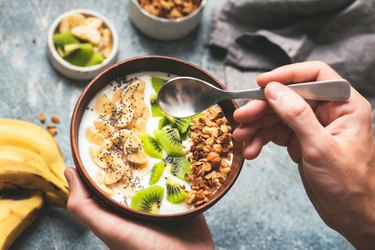
During sleep, your body may rest — but it's always at work.
While you catch zzzs, your digestive system stays active — although at a slower rate than while you're awake — and this is the time when the gut essentially repairs itself, says Mahmud Kara, MD, an internal medicine physician and founder of KaraMD.
Video of the Day
Video of the Day
"Your evening routine can either help with this reset process or interfere with it, depending on the habits in that routine," Dr. Kara says.
To continue thriving and functioning optimally throughout the day, prepare your gut for its nightly ritual by adopting these habits.
1. Limit Screens
After you've had one Zoom call after another, tended to the needs of your family and cleaned after dinner, lounging in front of the TV (or scrolling through Instagram) sounds like a nice way to unwind.
And while it's OK in moderation, try to nix screen time an hour (or preferably more) before bedtime, recommends Joseph Shami, MD, a gastroenterologist with Gastroenterology Associates of New Jersey.
Why does this matter? Watching something on a screen — even a charming, lighthearted sitcom — can raise your levels of stress hormones (e.g. adrenaline) because it requires you to pay attention, Dr. Shami says. When your body is revved up like that, you might find it harder to drift off to sleep when your head hits the pillow, which can affect your overall sleep quality.
2. Skip the Bedtime Snack
Right before you head upstairs to wash your face and tuck yourself into bed, you catch a glimpse of your favorite cookies — and you're tempted to have nibble.
Resist if you can, though: It's better to give your stomach at least a few hours of rest before falling asleep, says William Li, MD, an internal medicine physician and author.
Eating a bedtime or midnight snack can disrupt the health of your microbiome, the 39 trillion or so bacteria that live in your gut.
"These bacteria have a biological clock that tells them not to expect food at nighttime," Dr. Li says. "When they encounter food at night, their clock is thrown off, and the bacteria do not make normal amounts of short-chain fatty acids that are needed for healthy metabolism."
Though not a big deal occasionally (hey, we all get the munchies sometimes), Dr. Li says over time, habitual late-night snacking can lead to metabolic syndrome — and a December 2018 longitudinal study in BMC Public Health backs this up.
This can not only make it difficult for you to lose weight when needed for your health, but it puts you at a higher risk for strokes, diabetes and other health issues.
3. Choose Dinner Foods That Support Gut Health
Your last meal of the day is dinner, and though it may feel like an all-out sprint to get it on the table in busy households, it's important you pay attention to what you're noshing on before bed.
Your diet plays a crucial role in your gut health, Dr. Kara says. Indeed, what you eat can change your microbiome (for better or worse), according to an April 2017 review in the Journal of Translational Medicine, and that can have ripple effects on your overall health.
So, what should you eat? Try to focus on these two important components of gut-friendly foods: probiotics and prebiotics.
Probiotics are the live organisms that provide the bacteria we need for our gut to thrive, Dr. Kara says. Prebiotics are fibrous compounds that feed the probiotics in our gut.
Foods high in probiotics include:
- Yogurt
- Kefir
- Fermented cheeses (blue, cheddar, Gouda, mozzarella)
- Sauerkraut
- Kimchi
- Pickles and other fermented veggies
- Miso
- Tempeh
- Natto
Foods high in prebiotics include:
- Bananas
- Artichokes
- Asparagus
- Alliums (leeks, garlic, onions)
- Whole grains (oats, whole wheat, barley)
- Honey
"Another important way to eat to support a healthy microbiome is to select organic, whole-food options whenever possible," Dr. Kara says. "This helps to ensure that you are getting the right nutrients your gut needs to thrive, and you are avoiding any harmful preservatives or chemicals that can interrupt the normal balance of your microbiome."
4. Drink Water
Waking up at 3 a.m. to pee is no fun, but don't let the prospect of a nighttime bathroom trip keep you from hydrating in the evening. Alongside your diet, hydration is one of the most important factors in digestive health, Dr. Kara says.
Staying properly hydrated helps fuel numerous processes in the body. Water in your body keeps everything flowing smoothly, giving your organs all they need to work and heal.
"Throughout your evening routine, make sure you are drinking enough water, as it helps prevent constipation, breaks down food in the digestive tract, reduces inflammation in the gut microbiome and improves detoxification processes," Dr. Kara says.
If you were recently on antibiotics or had a stomach bug, H2O might even be more important before bed. Some studies — including a January 2022 paper in The Journal of Nutrition — have suggested drinking water can help improve gut microbiome diversity, which in turn can help improve the overall gut flora.
Tip
Need an easy way to determine how much water to drink every day? Divide your body weight (in pounds) in half to get the number of ounces you should aim for. For example, if you weigh 180 pounds, aim for 90 ounces (about 11 cups) per day.
5. Try to Lower Your Stress Levels Before Bedtime
Your partner is sound asleep next to you, the kiddos have retired to their beds. And yet, you're somehow wide awake, starting at the ceiling, willing yourself to catch zzzs — but you can't get tomorrow's to-do list out of your head.
It's maybe no surprise that stress can interfere with sleep, but it can also mess with your gut health.
There's a direct link between the gut and the brain, known as the "gut-brain axis," says Raphael Kellman, MD, an internist and functional medicine physician at the Kellman Center. This means chronic stress can lead to alterations to the gut microbiome, making us more susceptible to health issues.
"We all live with daily stress, but the ability to appropriately deal with that stress and manage it in a healthy way is crucial to our gut health, as well as our overall health and wellness," Dr. Kellman says. "Stress is unavoidable, but recognizing the stresses you do have in life and incorporating natural ways to reduce those stresses is crucial for our health."
Dr. Kellman suggests practicing simple stress-management techniques before bed like breathing exercises or meditation. During the day, keep stress levels in check by getting outside in nature for a walk or seeking the support of friends and family.
6. Gently Move Your Body
Though you probably don't want to sprint a few miles on your treadmill and then attempt to fall into a deep sleep, gently moving your body can improve the digestive process, increase gut microbiome diversity and encourage "good" bacteria growth, Dr. Kara says.
"During your evening routine, try to incorporate light to moderate exercises like stretching, yoga or a brisk walk outside," he recommends.
We bet your furry best friend would appreciate an extra walk — and it helps you, too.
7. Sleep on Your Left Side
Though not everyone has a sensitive tummy, if you're one of the many who have some sort of irritability or reflux, your sleeping position can make a difference in your comfort and your gut health, says Ali Rezaie, MD, medical director of the GI Motility Program at Cedars-Sinai, Los Angeles and director of the GI Motility Fellowship Training Program.
People with gastroesophageal reflux disease (GERD) especially may benefit from sleeping on their left side because it helps decrease the amount of acid that comes from your stomach into your esophagus, according to a December 2022 paper in the Journal of Clinical Sleep Medicine.
- BMC Public Health: "Association of night eating habits with metabolic syndrome and its components: a longitudinal study"
- Cell Host & Microbe: "Effects of diurnal variation of gut microbes and high-fat feeding on host circadian clock function and metabolism"
- Journal of Translational Medicine: "Influence of diet on the gut microbiome and implications for human health"
- The Journal of Nutrition: "Drinking Water Source and Intake Are Associated with Distinct Gut Microbiota Signatures in US and UK Populations"
Was this article helpful?
150 Characters Max
0/150
Thank you for sharing!
Thank you for your feedback!
Is this an emergency? If you are experiencing serious medical symptoms, please see the National Library of Medicine’s list of signs you need emergency medical attention or call 911.








